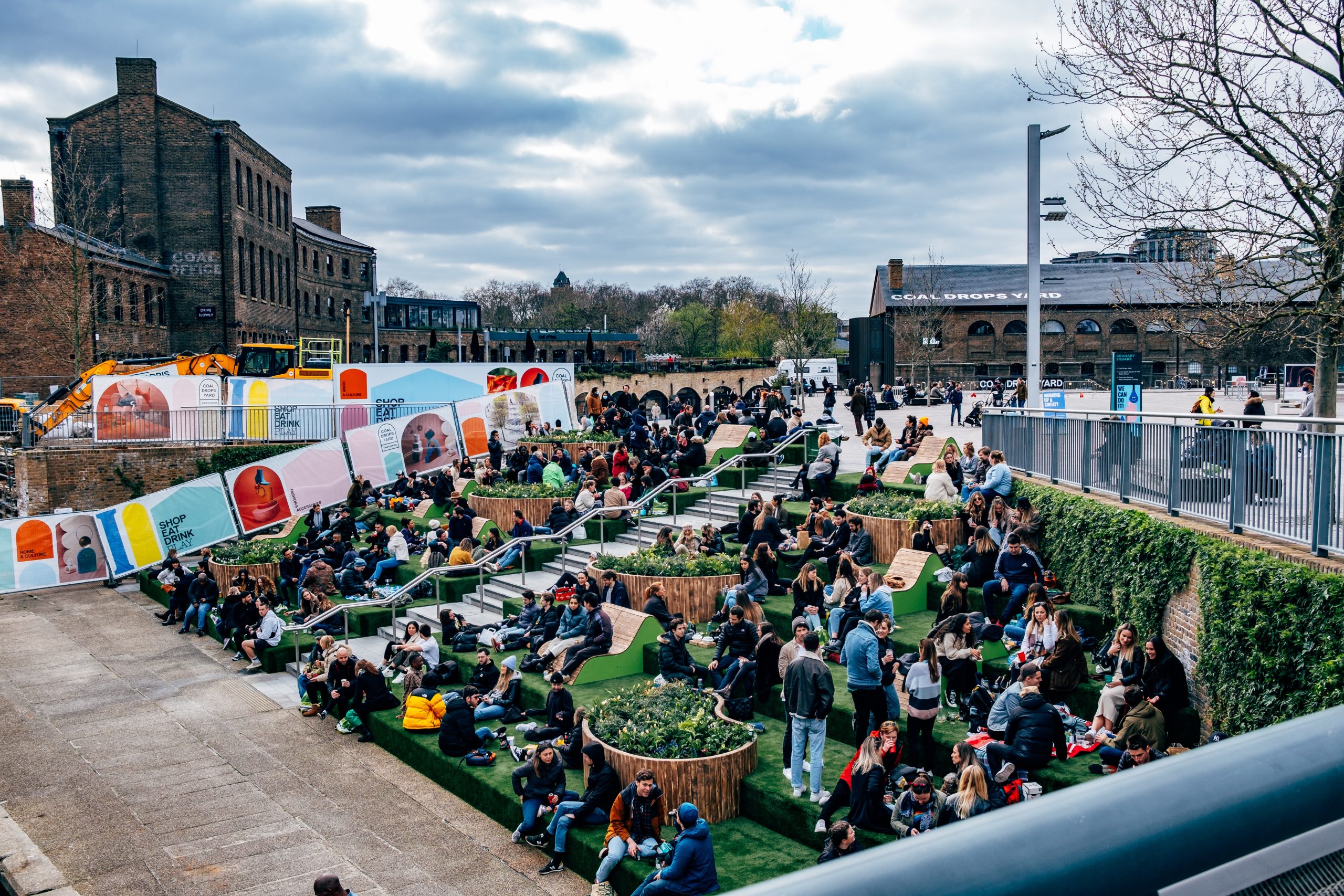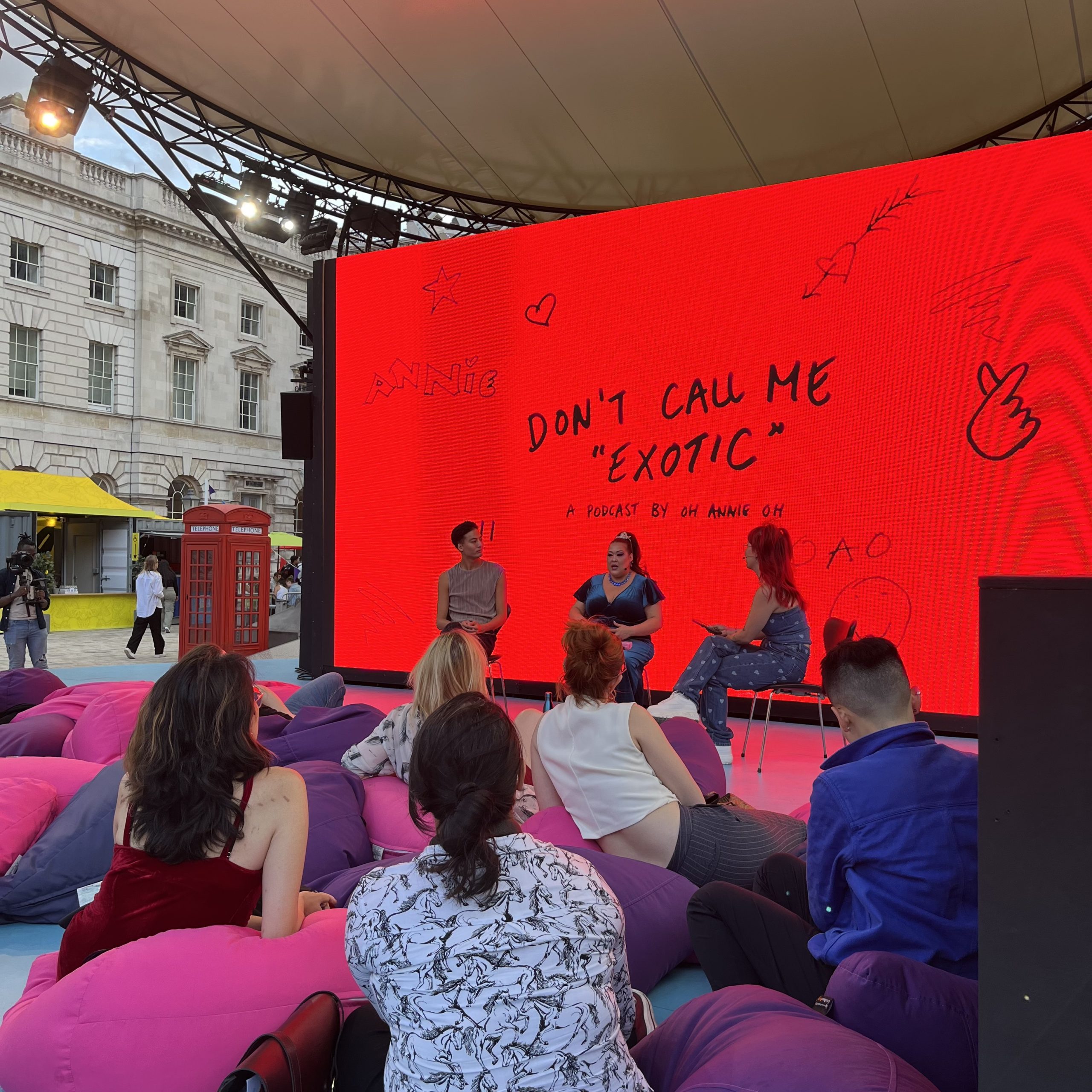Beyond the cubicle: Is office space relevant in 2022?

As part of our Digital Dialogues series, Futurecity Researcher Beverly Chan talks to Futurecity Associate Imran Hussain, Founder of THC/ Endeavour, a collaborative marketing communications agency exploring new approaches to how we live, work and play in our global cities.
Beverly Chan calls Imran from the kitchen table in her London flat. He accepts the call, the screen comes into focus, he is seated on a wooden bench nearby the recently opened Chateau Denmark along London’s Denmark Street, trees blurring in the background. They discuss the nature of post-pandemic work and the future of the urban office. In a new era of working-from-home, Imran makes a passionate case for returning to the office; it endures as a creative place in its own right.
Imran Hussain
I can’t imagine a London without offices. Sali Hughes wrote about Brighton when Soho House opened its new club there this summer. I liked how it was a love letter of some sort to her city – it was something very special because it really caught the pulse of the city.
Beverly Chan
What would your love letter say to the office of 2022?
’22 + O. Living and working through lockdown felt like, what I imagine, being trapped in one of those pods in The Matrix. For decades the workplace, as much as the home, has been one of the most important places of our lives. Take one of those places away and all seven days become the same.
I think about the way city life normalises after a crisis. More than reinvention, the real story of London is about endurance. Resilience without sacrificing everything about the older world, because what makes places are people. If we remove ourselves from the office, we lose an important part of the urban economy and we lose all that comes with the office – everything that is more than just about the work.
A pub fills up in the evening because there are offices next door. A hotel is occupied through the seasons because business travellers need a place to stay. If nothing else, the office is a powerful bass drum for city life. It’s this spill-over, this ecosystem of businesses serving each other, that defines communities. Places like the office play a role in bringing us together, allowing for happenstance, footfall, movement, which brings novelty and change, and the constant push to learn and evolve.

Beverly Chan
It’s like the office and the city are inseparable. What do you think about companies who closed shop when the pandemic hit and moved their operations entirely online for good, or about the strong cases arguing that working from home increases productivity?
Depending on the industry, productivity is a very subjective thing. It’s not finite or absolute. Working from home is not less or more important than working from the office. It’s simply different.
Do we really need to attract people to leave the house? Have things gotten that bad? I’d say the cubicle began to look very appealing during Lockdown 3.
The home is closed off from so many things. The watercooler conversation has evaporated. It’s like streaming TV no one has real-time conversations about TV shows anymore because everybody is watching different shows, on-demand, on their own, at different times —
Barking erupts in the neighbourhood park. Imran rotates his mobile phone to show Beverly two large dogs fighting close by.
Can you see? This wouldn’t happen at home! These kinds of things all play a role. I can’t imagine a world where people only work from home. The office is a place based on community and friction, and we need both for creativity. Creativity is happiness, joy, triumph, rage, sadness, jubilation, all mixed into one. Plus, it’d be untenable. If I’m a boss and I can get someone in another country to do the job for half of the price. . . Surely a matter that affects local economy.
Beverly Chan
The hospitality industry is one in particular that brings people together for many reasons, one of which is a reliance on people to show up. It depends on cooks, farmers, delivery persons, servers, all front- and back-of-house staff at hotels. The pandemic has shown us the value in this. Do you think hospitable places can inspire new kinds of workplaces?
Yes. Hospitality has a sense of togetherness, a collective energy where all components come together. The hotel experience is partly for leisure, partly for business. I like that each part is not so easily broken off. The office environment shouldn’t be so siloed either, because office culture is travel, seeing, socialising, thinking, eating, drinking—it’s all that we do in the built environment.
One of my friends is bringing hotel-level service to co-working environments with things like drinks trolleys, a concierge, and so on. There are newer buildings that are part offices, part hotels. It’s about how we see value in a building’s programming. An office building can also be apartments, a venue space, guitar shop, rooftop restaurant, retail shops. It all makes sense because it all works together, as a slice of a city, and the more mixed-use a building, the more public value there should be.
Beverly Chan
What’s the larger conversation that needs to happen now amongst developers, employers, and employees?
Imran Hussain
If the organisation needs to change to serve the workforce, it must be a balanced argument. Real estate developers need to activate their buildings to illustrate that things are happening there. Employers can create cultural programmes of events because, really, it’s during the little breaks or half-time huddles when the real things happen. Better office design is a perk, not an expectation, but it brings in more people to use spaces and allows them to give value to each other’s lives.
One size does not fit all, but we’ll always go for the path of least resistance, and then realise we can’t go back because there’s no money in it anymore. The metaverse sounds a little like working from home. We’ve lost, or are running on fumes in, great industries, such as the publishing industry, all because at one time or another we thought we could save a bit of money but we ended up losing something we love.
Physical location matters. We’d be miserable if we ended up losing neighbourhoods like Fitzrovia, Soho, Covent Garden, town centres—because these neighbourhoods are defined by people, so let’s give them places to enjoy.

Imran Hussain is a Director at THC/ Endeavour – a collaborative marketing communications agency. With clients such as Chateau Denmark, he’s also worked on the Great Northern Hotel. The Pilgrm, The Zetter Group, Gotham, citizenM, Bespoke Hotels and Shinola. In addition he’s collaborated with brands Somerset House, Coco de Mer, Film4, Tiffany & Co.
For more information on Futurecity Projects please go to https://futurecity.co.uk/
Check out our Digital Dialogues series for more thought leadership interviews.
Image credits:
Image 1: Aerial shot of City of London sourced via Unsplash
Image 2: Coal Drops Yard sourced via Unsplash
Image 3: Summer events at Somerset House. Photo by Futurecity
